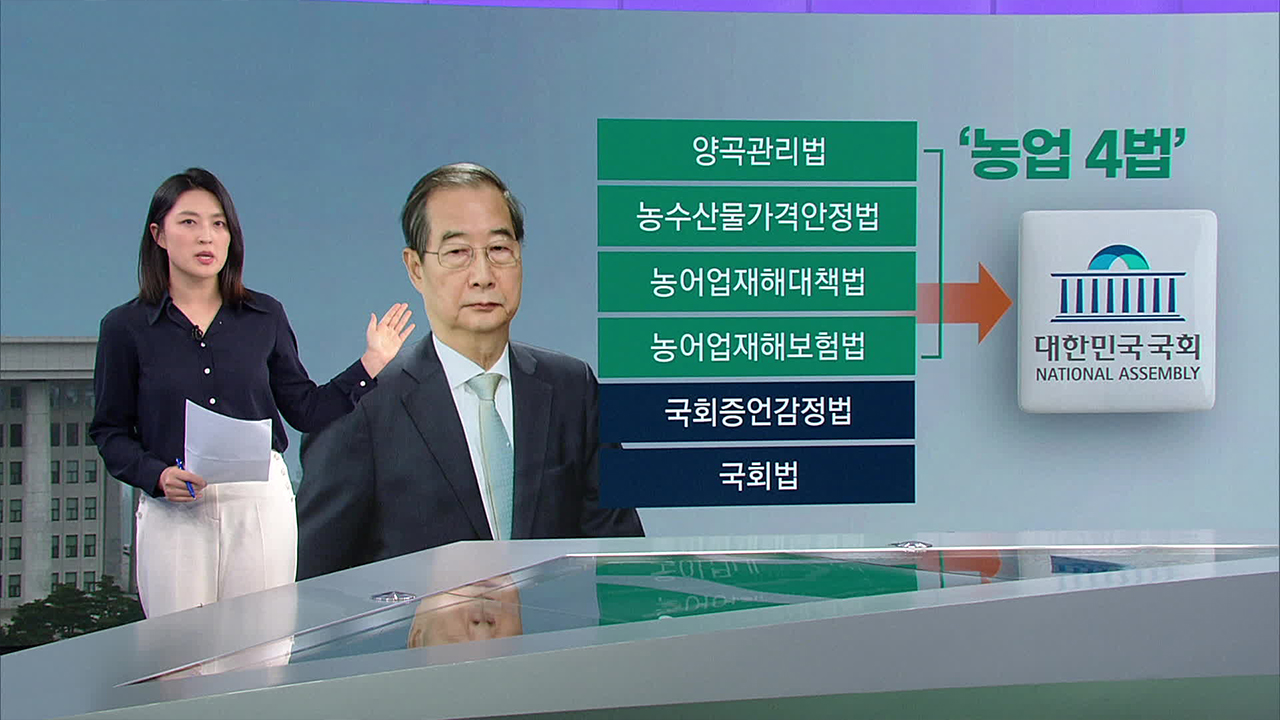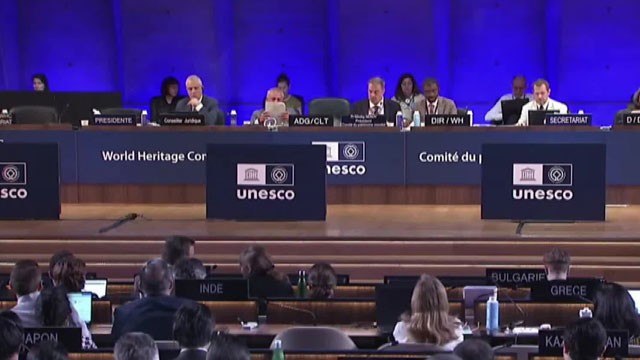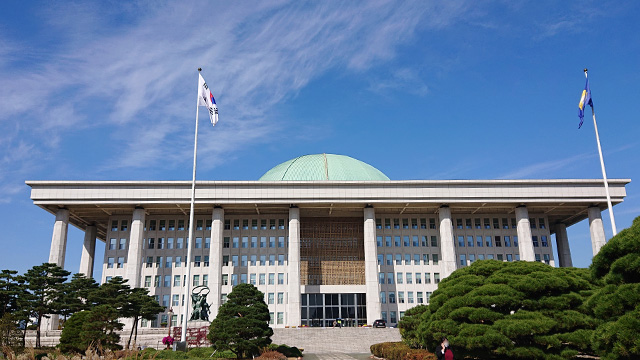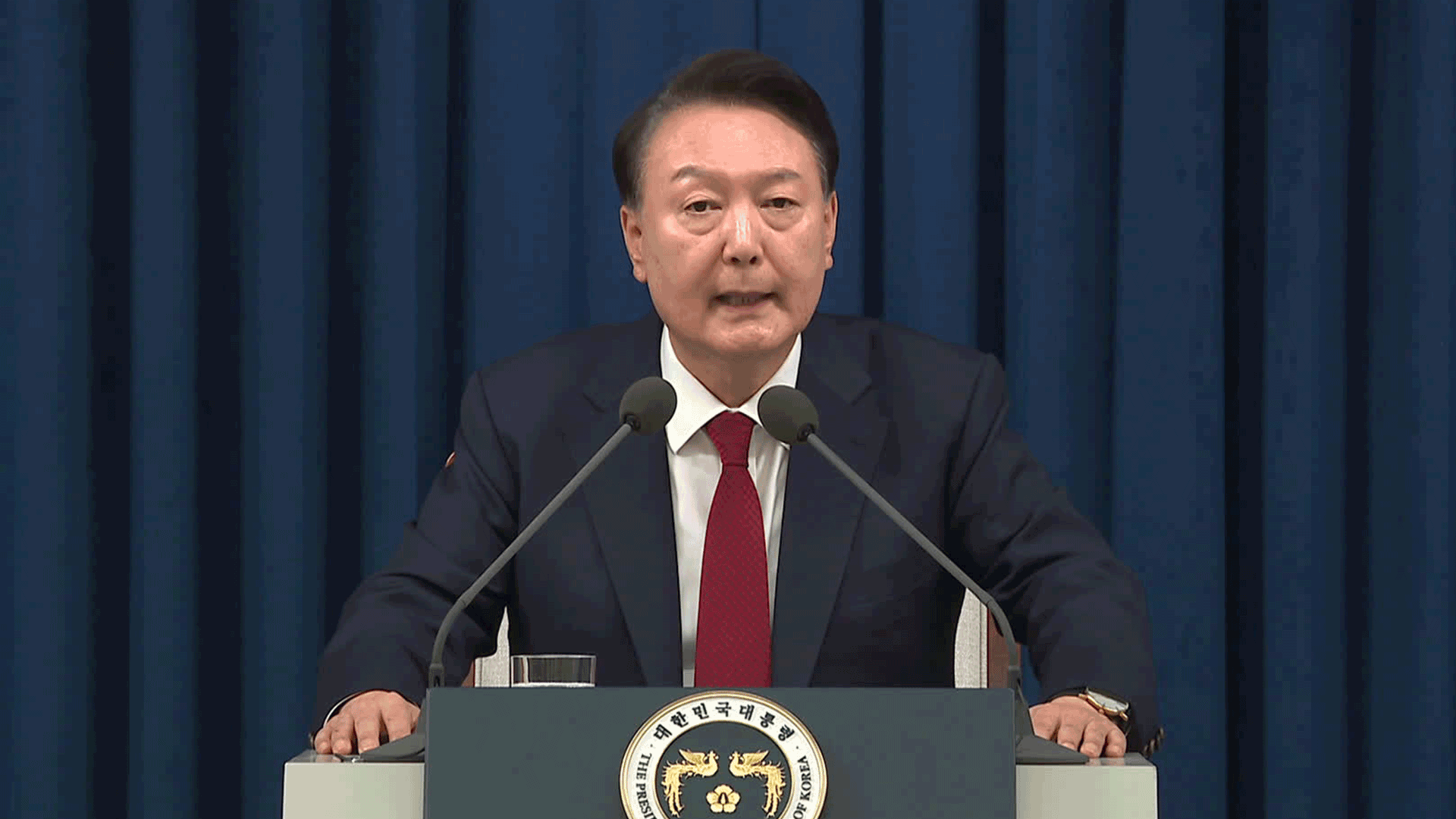[Anchor]
Let's take a detailed look at the six bills that the acting authority has vetoed, specifically what they entail and what the issues are.
Reporter Moon Ye-seul has the story.
[Report]
Acting President Han Duck-soo has exercised his veto power, also known as the right to request reconsideration, returning six bills to the National Assembly.
These include the so-called 'Four Agricultural Laws' amendment, the National Assembly Act, and the National Assembly Testimony and Appraisal Act amendment.
First, looking at the Grain Management Act, this is the 'first bill' of Democratic Party leader Lee Jae-myung and has been in conflict with President Yoon Suk Yeol's 'first veto' for nearly two years.
The bill mandates the government to implement measures such as purchasing surplus rice and allows the government to pay the difference if prices fall below a certain level.
The government and the ruling party oppose this, citing financial burdens and the possibility that increased rice supply could further lower rice prices, while the opposition argues that it is essential for guaranteeing farmers' income and stabilizing rice prices.
Similarly, an amendment to ensure compensation for the difference in agricultural product prices when they fall, and for the government to cover farmers' losses in the event of disasters without insurance premium surcharges, has also been sent back for further discussion in the National Assembly.
This includes the amendments to the National Assembly Testimony and Appraisal Act and the National Assembly Act.
These amendments would prevent the refusal of attendance or document submission requests from the National Assembly on grounds of personal information or trade secrets, and abolish the automatic referral of budget bills and related laws to the plenary session after the legal deadline has passed.
While these six bills have returned to the National Assembly, there are also two special prosecutor laws that have been sent from the National Assembly.
A decision on whether to exercise veto power regarding the special prosecutor laws must be made by Dec. 31.
Additionally, the appointment of three Constitutional Court justices recommended by the National Assembly, which the opposition aims to process in the plenary session on Dec. 27, is also a task that the acting authority must address.
This is KBS News, Moon Ye-seul.
Let's take a detailed look at the six bills that the acting authority has vetoed, specifically what they entail and what the issues are.
Reporter Moon Ye-seul has the story.
[Report]
Acting President Han Duck-soo has exercised his veto power, also known as the right to request reconsideration, returning six bills to the National Assembly.
These include the so-called 'Four Agricultural Laws' amendment, the National Assembly Act, and the National Assembly Testimony and Appraisal Act amendment.
First, looking at the Grain Management Act, this is the 'first bill' of Democratic Party leader Lee Jae-myung and has been in conflict with President Yoon Suk Yeol's 'first veto' for nearly two years.
The bill mandates the government to implement measures such as purchasing surplus rice and allows the government to pay the difference if prices fall below a certain level.
The government and the ruling party oppose this, citing financial burdens and the possibility that increased rice supply could further lower rice prices, while the opposition argues that it is essential for guaranteeing farmers' income and stabilizing rice prices.
Similarly, an amendment to ensure compensation for the difference in agricultural product prices when they fall, and for the government to cover farmers' losses in the event of disasters without insurance premium surcharges, has also been sent back for further discussion in the National Assembly.
This includes the amendments to the National Assembly Testimony and Appraisal Act and the National Assembly Act.
These amendments would prevent the refusal of attendance or document submission requests from the National Assembly on grounds of personal information or trade secrets, and abolish the automatic referral of budget bills and related laws to the plenary session after the legal deadline has passed.
While these six bills have returned to the National Assembly, there are also two special prosecutor laws that have been sent from the National Assembly.
A decision on whether to exercise veto power regarding the special prosecutor laws must be made by Dec. 31.
Additionally, the appointment of three Constitutional Court justices recommended by the National Assembly, which the opposition aims to process in the plenary session on Dec. 27, is also a task that the acting authority must address.
This is KBS News, Moon Ye-seul.
■ 제보하기
▷ 카카오톡 : 'KBS제보' 검색, 채널 추가
▷ 전화 : 02-781-1234, 4444
▷ 이메일 : kbs1234@kbs.co.kr
▷ 유튜브, 네이버, 카카오에서도 KBS뉴스를 구독해주세요!
- Acting president vetoes six bills
-
- 입력 2024-12-19 23:55:01

[Anchor]
Let's take a detailed look at the six bills that the acting authority has vetoed, specifically what they entail and what the issues are.
Reporter Moon Ye-seul has the story.
[Report]
Acting President Han Duck-soo has exercised his veto power, also known as the right to request reconsideration, returning six bills to the National Assembly.
These include the so-called 'Four Agricultural Laws' amendment, the National Assembly Act, and the National Assembly Testimony and Appraisal Act amendment.
First, looking at the Grain Management Act, this is the 'first bill' of Democratic Party leader Lee Jae-myung and has been in conflict with President Yoon Suk Yeol's 'first veto' for nearly two years.
The bill mandates the government to implement measures such as purchasing surplus rice and allows the government to pay the difference if prices fall below a certain level.
The government and the ruling party oppose this, citing financial burdens and the possibility that increased rice supply could further lower rice prices, while the opposition argues that it is essential for guaranteeing farmers' income and stabilizing rice prices.
Similarly, an amendment to ensure compensation for the difference in agricultural product prices when they fall, and for the government to cover farmers' losses in the event of disasters without insurance premium surcharges, has also been sent back for further discussion in the National Assembly.
This includes the amendments to the National Assembly Testimony and Appraisal Act and the National Assembly Act.
These amendments would prevent the refusal of attendance or document submission requests from the National Assembly on grounds of personal information or trade secrets, and abolish the automatic referral of budget bills and related laws to the plenary session after the legal deadline has passed.
While these six bills have returned to the National Assembly, there are also two special prosecutor laws that have been sent from the National Assembly.
A decision on whether to exercise veto power regarding the special prosecutor laws must be made by Dec. 31.
Additionally, the appointment of three Constitutional Court justices recommended by the National Assembly, which the opposition aims to process in the plenary session on Dec. 27, is also a task that the acting authority must address.
This is KBS News, Moon Ye-seul.
Let's take a detailed look at the six bills that the acting authority has vetoed, specifically what they entail and what the issues are.
Reporter Moon Ye-seul has the story.
[Report]
Acting President Han Duck-soo has exercised his veto power, also known as the right to request reconsideration, returning six bills to the National Assembly.
These include the so-called 'Four Agricultural Laws' amendment, the National Assembly Act, and the National Assembly Testimony and Appraisal Act amendment.
First, looking at the Grain Management Act, this is the 'first bill' of Democratic Party leader Lee Jae-myung and has been in conflict with President Yoon Suk Yeol's 'first veto' for nearly two years.
The bill mandates the government to implement measures such as purchasing surplus rice and allows the government to pay the difference if prices fall below a certain level.
The government and the ruling party oppose this, citing financial burdens and the possibility that increased rice supply could further lower rice prices, while the opposition argues that it is essential for guaranteeing farmers' income and stabilizing rice prices.
Similarly, an amendment to ensure compensation for the difference in agricultural product prices when they fall, and for the government to cover farmers' losses in the event of disasters without insurance premium surcharges, has also been sent back for further discussion in the National Assembly.
This includes the amendments to the National Assembly Testimony and Appraisal Act and the National Assembly Act.
These amendments would prevent the refusal of attendance or document submission requests from the National Assembly on grounds of personal information or trade secrets, and abolish the automatic referral of budget bills and related laws to the plenary session after the legal deadline has passed.
While these six bills have returned to the National Assembly, there are also two special prosecutor laws that have been sent from the National Assembly.
A decision on whether to exercise veto power regarding the special prosecutor laws must be made by Dec. 31.
Additionally, the appointment of three Constitutional Court justices recommended by the National Assembly, which the opposition aims to process in the plenary session on Dec. 27, is also a task that the acting authority must address.
This is KBS News, Moon Ye-seul.
-
-

문예슬 기자 moonster@kbs.co.kr
문예슬 기자의 기사 모음
-
이 기사가 좋으셨다면
-
좋아요
0
-
응원해요
0
-
후속 원해요
0












![[단독] 김건희 특검, ‘공천 개입’ 관련 김영선 전 의원 소환 통보…일정 조율 중](/data/news/2025/07/16/20250716_p7hDHF.jpg)


이 기사에 대한 의견을 남겨주세요.